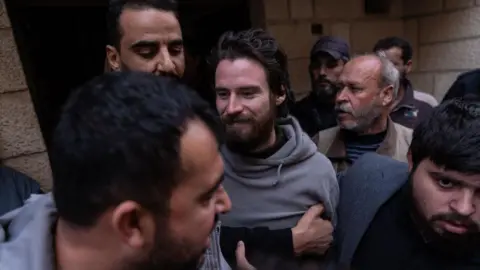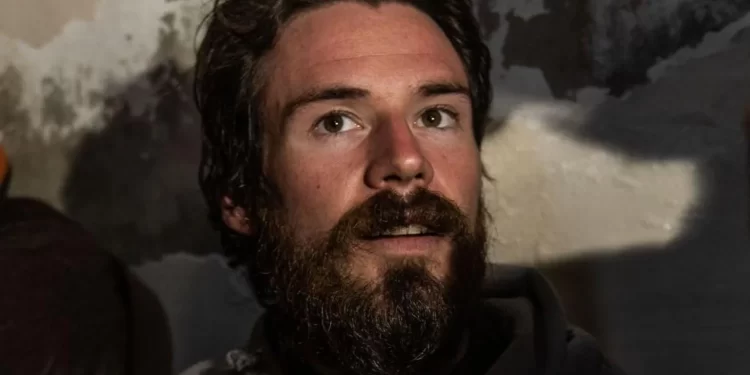‘It wasn’t too bad’ – US man on his time in a Syrian prison
A US man, detained for months in a Syrian prison after entering the country on foot, has described being freed by hammer-wielding men as rebels overthrew the regime of Bashar al-Assad.
The man – who later identified himself as Travis Timmerman to the BBC’s US news partner CBS – was found by residents near the capital Damascus.
It comes as rebels say they intend to close Assad’s notoriously harsh prisons and track down those involved in torturing or killing detainees.
“We will pursue them in Syria, and we ask countries to hand over those who fled so we can achieve justice,” said rebel leader Ahmed al-Sharaa, also known as Abu Mohammed al-Jolani.
 Getty Images
Getty ImagesFootage posted on social media showed Mr Timmerman lying on a sofa as residents spoke to local reporters.
He said he had been arrested upon entering the country seven months ago.
The American was reported as missing in May, having last been seen in the Hungarian capital Budapest, according to the Missouri State Highway Patrol and the Hungarian authorities.
On Monday, a day after rebels took control of Damascus and toppled Assad, Mr Timmerman said two men armed with a hammer broke open his prison door.
It was “busted down, it woke me up”, he said.
“I thought the guards were still there, so I thought the warfare could have been more active than it ended up being… Once we got out, there was no resistance, there was no real fighting.”
The 30-year-old said he left prison with a large group of people and had been attempting to make his way to Jordan.
He said he “had a few moments of fear” when he left the prison, adding that he had since been more worried about finding somewhere to sleep.
However, local people had been receptive to his requests for food and assistance, he told reporters.
“They were coming to me, mostly,” Mr Timmerman said.
Syria’s new interim government “freed and secured” Mr Timmerman, it confirmed in a message on the Telegram messaging service on Thursday.
US Secretary of State Antony Blinken said that Washington was “working to bring [Mr Timmerman] home”.
Blinken, speaking during a visit to Jordan, added that he could not give any details about “exactly what’s going to happen”.
Thousands of prisoners have been released since the fall of Assad over the weekend.
Footage has shown men, women and in some cases children emerging from overcrowded windowless cells, often disorientated and unaware of events that had taken place outside.
However, Mr Timmerman appears to have been relatively well-treated, telling CBS: “I’m feeling well. I’ve been fed and I’ve been watered, so I’m feeling well.”
He added that he had had the use of a mobile phone during his detention and had spoken to his family three weeks ago.
Speaking to fellow US outlet NBC, Mr Timmerman said he had crossed the mountains between Lebanon and Syria on a “pilgrimage” and had “been reading the scripture a lot”.
He declined the opportunity to be put in touch with American officials.
 Getty Images
Getty ImagesRichard Timmerman, who identified himself as the freed prisoner’s great-uncle, said the last time he heard from him he had been working in Chicago.
“The family had been looking for him, but no-one’s been able to find anything about him,” he was quoted as saying by the New York Times.
“He’s very responsible,” he added. “He’s not a criminal kind of person.”
On Tuesday, State Department spokesperson Matthew Miller said the US had asked Syria’s main rebel group Hayat Tahrir al-Sham (HTS) to help locate and free US journalist Austin Tice.
A freelance journalist, Mr Tice is thought to have been taken captive close to Damascus on 14 August 2012 while he was covering the country’s civil war.
He was last seen in a video, blindfolded and in apparent distress – posted online weeks after his capture. The US believes he was being held by the Assad regime.
President Joe Biden has said the US believes Mr Tice is alive, but they must pinpoint his location.
Syria’s new leadership said on Thursday the search for Mr Tice was “ongoing,” and that it was ready to “cooperate directly” with the US to find Americans that disappeared under the Assad regime.
The now collapsed regime was notorious for its extremely harsh prisons, where the UK-based monitoring group Syrian Observatory for Human Rights estimates almost 60,000 people were tortured and killed.
Across Syria this week, families desperate to find loved ones have been streaming into these dark prison sites.
The Syrian Civil Defence Organisation, known as the White Helmets, has been helping the search – including in the infamous Saydnaya prison complex, described by human rights groups as the “human slaughterhouse”.
“We’re looking for secret prisons in several areas of Damascus,” Raed Saleh, director of The White Helmets told the BBC.
“We can’t say too much about this, but we’re looking.”
The White Helmets, known for pulling survivors from the rubble during Syria’s devastating civil war, say they helped recover thousands of detainees from the prisons.
But many families are still searching in vain.
“What took place in Saydnaya is very painful for the families who were waiting for their loved ones,” Saleh acknowledged.
“Our inability to reach anyone else in Saydnaya after the initial release of prisoners means that those people who were there are either dead or in another place.
“We have at least two teams looking for prisoners.
“One team with police sniffer dogs is looking for survivors. Another team is specialised in lock breaking and entering cells.”






